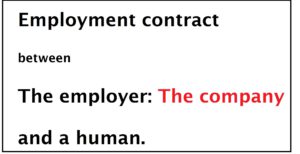Have you ever wondered why a company sometimes decides to do something that only serves profit and not people?
Can a company even make human decisions? The people, the shareholders or stockholders, do have a financial stake in the company and are entitled to dividends, but the company itself is an independent institution. A legal institution has no human characteristics.
The deposits belong to this institution. Neither the shareholders nor the stockholders can withdraw their money at any time. The employees also belong to the company. Every employee, right up to the CEO, has signed an employment contract with the company and is responsible for the company’s well-being. The company is doing well when it grows. The faster, the better.

A human being would certainly make a humane decision. But a corporation? The corporation has no understanding whatsoever of what people want. The corporation has no sense of the problems of humanity. It is not interested in inequality. The only thing the corporation is interested in is maximising profit. Nothing else. And if pressure from the state creates too much friction in the corporation, then the corporation will go elsewhere. Globalisation has cleared all the paths for this.
The company can take unlimited risks to optimise profits because its liability is limited. Whether the rainforests or the fish disappear from the sea is of no concern to the company. Environmental disasters are collateral damage of this action, which knows no risk.
The only thing that interests the company is to get the raw materials and the labour for its production as cheaply as possible. Where these raw materials come from and under what circumstances they are extracted and produced is also of no concern to the company. And the fact that the products are breaking down faster and faster is something the company particularly likes.
Those in positions of responsibility within the company are contractually obliged to be loyal to that company. If they do not fulfil this duty with sufficient commitment, they will lose their job. And the people in charge would be very reluctant to lose their top salaries. If the company orders planned obsolescence or cheating on the fuel consumption of cars, the employees have to toe the line. Whether they like it or not. Their responsibility is limited to ensuring that the company is doing well.
The entire global economy consists of such companies. These are large companies like Walmart or Amazon, but even the bicycle courier is at the mercy of his company. If he doesn’t get a few orders in a row, he can’t pay his rent.
Many people are also thinking about reforming the existing financial system. These people forget that banks are also institutions. The symbiosis between the economy and the financial system works perfectly, as the rapid recovery from the consequences of the Covid-19-related economic downturn has shown. The ‘invisible hand’ will not allow humans to change this construct of economy and financial system.
This development of the economy is irreversible. We are at the mercy of companies. And the company will react to everything we do with the help of the ‘invisible hand of the market’. Conventional solutions will not help us.